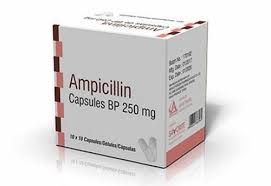Ampicillin is a penicillin antibiotic used to treat a variety of bacterial infections. It works by inhibiting bacterial cell wall synthesis, which ultimately leads to the death of the bacteria. This formulation is particularly effective against infections caused by susceptible strains of bacteria.
Dosage Form:
- Strength: 250 mg per capsule
- Packaging: Available in packs of 100 capsules (10 x 10).
Indications
Ampicillin is indicated for the treatment of:
- Respiratory Tract Infections: Such as pneumonia and bronchitis.
- Ear Infections: Including otitis media.
- Urinary Tract Infections: Such as cystitis and pyelonephritis.
- Gastrointestinal Infections: Including infections caused by susceptible strains.
- Meningitis: Infection of the membranes surrounding the brain and spinal cord.
Dosage
The typical dosage for adults and children over 12 years is:
- For Mild to Moderate Infections: 250 mg every 6 hours (four times a day) or as directed by a healthcare provider.
- For More Severe Infections: Higher doses may be prescribed based on the severity and type of infection.
Administration
- How to Take: Ampicillin capsules should be taken orally with a full glass of water. It can be taken with or without food, but taking it on an empty stomach may enhance absorption.
- Missed Dose: If you miss a dose, take it as soon as you remember. If it's almost time for your next dose, skip the missed dose and continue with your regular schedule. Do not double up on doses.
Common Side Effects
Possible side effects may include:
- Nausea and vomiting
- Diarrhea
- Abdominal pain
- Rash or itching
Serious side effects are rare but can include:
- Severe allergic reactions (e.g., hives, difficulty breathing)
- Clostridium difficile-associated diarrhea
- Liver dysfunction (symptoms may include jaundice or dark urine)
Warnings and Precautions
- Pregnant Women: Should consult a healthcare provider before use.
- Patients with Liver Disease: Caution is advised, and dosage adjustments may be necessary.
Drug Interactions
Ampicillin may interact with other medications, particularly:
- Anticoagulants: May enhance the effects of blood thinners like warfarin.
- Other Antibiotics: Use caution when combining with other antibiotics.

